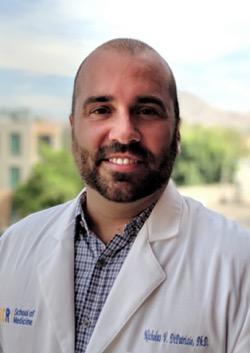School of Medicine’s Nicholas DiPatrizio will lead a team tasked with assessing the impact of long-term cannabis exposure on metabolic health and disease

Credit: UCR School of Medicine.
RIVERSIDE, Calif. — Nicholas V. DiPatrizio of the School of Medicine at the University of California, Riverside, has received a grant of $744,000 from the Tobacco-Related Disease Research Program, administered by the UC Office of the President, to investigate the impact of long-term cannabis exposure on metabolic diseases, such as Type 2 diabetes.
People in good metabolic health have ideal levels of blood sugar, triglycerides, high-density lipoprotein cholesterol, blood pressure, and waist circumference. Those with poor metabolic heath, on the other hand, have increased risk for heart disease, diabetes, and stroke. Researchers do not have a clear picture of the long-term impact cannabis use has on metabolic health, including diseases like Type 2 diabetes, which is marked by higher-than-normal levels of glucose in the blood.
DiPatrizio’s lab will study how cannabis affects the stable equilibrium of glucose — its “homeostasis” — in health and disease using a variety of cutting-edge technologies, such as tandem mass spectrometry.
“Scientists are still not sure how exactly long-term, or chronic, cannabis use affects health and a variety of tobacco-related pathologies, such as Type 2 diabetes, and other metabolic diseases,” said DiPatrizio, an assistant professor of biomedical sciences. “We will investigate in wild-type mice whether cannabis exposure is linked to higher incidence of Type 2 diabetes. We expect the knowledge we will gain in this project will help guide science-based public policy associated with the health impact of short-term and long-term cannabis use.”
The three-year grant is the first cannabis grant received on campus, requiring DiPatrizio to acquire a Drug Enforcement Agency Schedule 1 license to perform the research — also a first for UCR.
DiPatrizio explained that while short-term cannabis exposure in rodents and humans increases eating, long-term cannabis use is paradoxically linked to lower body weights. Indeed, long-term cannabis use in humans can lead to improvements in some metabolic parameters, such as raising high-density lipoproteins, or HDL, often called “good cholesterol.” As such, his lab will also explore possible benefits of long-term cannabis use to metabolic health.
“We will also investigate how important the endocannabinoid system, which cannabis hijacks, is for maintaining glucose homeostasis and if cannabis exposure dysregulates the process,” DiPatrizio said.
The endocannabinoid system is located throughout the mammalian body, including the brain and all peripheral organs. It participates in the control of many physiological functions, including food intake, energy balance, and reward. Endocannabinoids, the body’s own “natural cannabis,” are lipid signaling molecules that enhance eating by binding to cannabinoid receptors located on cells throughout the body — similar to keys (endocannabinoids) turning open locks (receptors).
DiPatrizio explained that glucose homeostasis in mammals is controlled by the nutrient-induced release in the small intestine of incretins, metabolic hormones that stimulate a decrease in blood glucose levels by driving insulin secretion, which is necessary for maintaining stable glucose levels.
His research group will assess the impact of tetrahydrocannabinol, or THC, exposure on incretin release in wild-type and transgenic mice that are engineered to lack cannabinoid receptors in the lining of their small intestines and in pancreatic beta cells. The small intestines and pancreas, both heavily involved in controlling metabolism, are known targets of cannabinoids.
DiPatrizio explained that THC, the main ingredient of cannabis, activates cannabinoid receptors on cells throughout the body and controls energy homeostasis. Some of the mice, making up the “control group,” will be fed a normal diet and remain lean; the rest will be put for 60 days on a high-fat and high-sugar diet, also called a Western diet, to turn them obese. Whole cannabis oil extracts, which naturally contain THC, and pure THC will be used in the experiments.
“We will explore if THC makes the obese mice leaner with improvements in metabolism,” DiPatrizio said. “We expect to find the endocannabinoid system in the small intestines of the lean mice controls incretin release and glucose homeostasis. Further, we suspect the endocannabinoid system becomes dysregulated in the obese mice and participates in cannabis-induced changes in metabolic function.”
DiPatrizio will be joined in the research by doctoral students and staff in his lab.
###
The Tobacco-Related Disease Research Program funds research that enhances understanding of tobacco use, prevention and cessation, the social, economic and policy-related aspects of tobacco use, and tobacco-related diseases in California. Solely funded through the tobacco tax and individual contributions, the program has funded more than 1,200 research grants on tobacco-related studies, with 95% of the revenue going directly to funding research and education efforts.
The University of California, Riverside (http://www.
Media Contact
Iqbal Pittalwala
[email protected]




